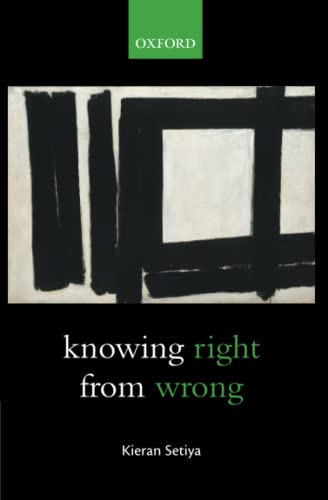Items related to KNOWING RIGHT FROM WRONG P

"synopsis" may belong to another edition of this title.
an excellent contribution to a perennially contested area. All philosophers can profit from this book, and should admire the meticulous craftsmanship and the modesty and intelligence of its explorations. (Simon Blackburn, Times Literary Supplement)
rich and provocative (Charlie Kurth, Notre Dame Philosophical Reviews)
"About this title" may belong to another edition of this title.
- PublisherOxford University Press
- Publication date2014
- ISBN 10 0198709617
- ISBN 13 9780198709619
- BindingPaperback
- Number of pages183
- Rating
Buy New
Learn more about this copy
Shipping:
£ 2.11
Within U.S.A.
Top Search Results from the AbeBooks Marketplace
Knowing Right from Wrong
Book Description Condition: New. Seller Inventory # 21657309-n
Knowing Right From Wrong
Print on DemandBook Description PAP. Condition: New. New Book. Shipped from UK. THIS BOOK IS PRINTED ON DEMAND. Established seller since 2000. Seller Inventory # L0-9780198709619
Knowing Right from Wrong
Book Description Condition: New. PRINT ON DEMAND Book; New; Fast Shipping from the UK. No. book. Seller Inventory # ria9780198709619_lsuk
Knowing Right From Wrong
Book Description Paperback / softback. Condition: New. This item is printed on demand. New copy - Usually dispatched within 5-9 working days. Seller Inventory # C9780198709619
Knowing Right from Wrong
Book Description Condition: New. Seller Inventory # 21657309-n
Knowing Right From Wrong
Book Description Condition: New. Seller Inventory # ABLIING23Feb2215580043481
Knowing Right From Wrong
Book Description Condition: New. Buy with confidence! Book is in new, never-used condition. Seller Inventory # bk0198709617xvz189zvxnew
Knowing Right From Wrong
Book Description Condition: New. New! This book is in the same immaculate condition as when it was published. Seller Inventory # 353-0198709617-new
Knowing Right From Wrong by Setiya, Kieran [Paperback ]
Book Description Soft Cover. Condition: new. Seller Inventory # 9780198709619
Knowing Right From Wrong (Paperback)
Book Description Paperback. Condition: new. Paperback. Can we have objective knowledge of right and wrong, of how we should live and what there is reason to do? The thought that we can is beset by sceptical problems. In the face of radical disagreement, can we be sure that we are not deceived? If the facts are independent of what we think, is our reliability a mere coincidence? Can it be anything but luck when our beliefs are true? In Knowing Right From Wrong, Kieran Setiya confronts these questions in theirmost compelling and articulate forms: the argument from ethical disagreement; the argument from reliability and coincidence; and the argument from accidental truth. In order to resist the inference fromdisagreement to scepticism, he argues, we must reject epistemologies of intuition, coherence, and reflective equilibrium. The problem of disagreement can be solved only if the basic standards of epistemology in ethics are biased towards the truth. In order to solve the problem of coincidence, we must embrace arguments for reliability in ethics that rely on ethical beliefs. Such arguments do not beg the question in an epistemically damaging way. And in order to make sense of ethical knowledge asnon-accidental truth, we must give up the independence of ethical fact and belief. We can do so without implausible predictions of convergence or relativity if the facts are bound to us through thenatural history of human life. If there is objective ethical knowledge, human nature is its source. Can we have objective knowledge of right and wrong, of how we should live and what there is reason to do? Can it be anything but luck when our beliefs are true? Kieran Setiya confronts these questions in their most compelling and articulate forms, and argues that if there is objective ethical knowledge, human nature is its source. Shipping may be from multiple locations in the US or from the UK, depending on stock availability. Seller Inventory # 9780198709619

